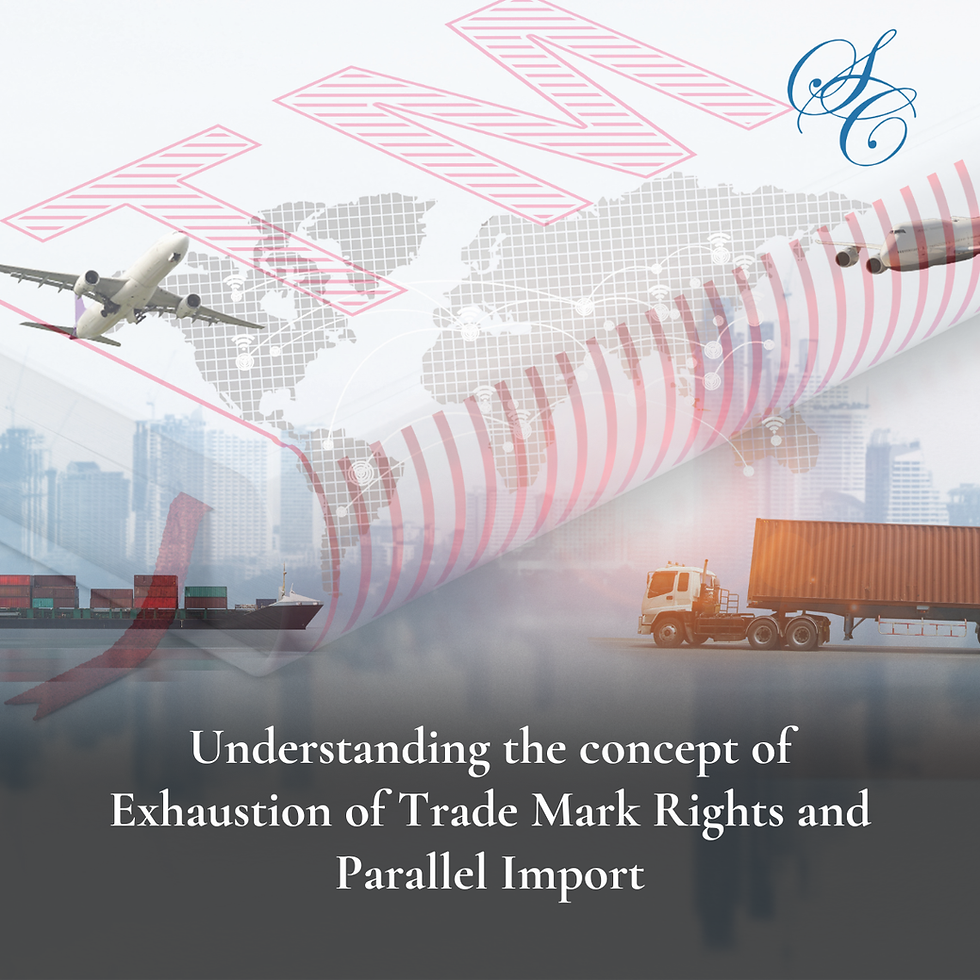ZARA – the clothing brand v. the restaurant!
- Sarwajeet Singh
- Jun 9, 2015
- 4 min read
A recent judgement pronounced by the Delhi High Court on May 19, 2015, would have come as a huge relief for international fashion brand ZARA. In this case, the owners of the fashion brand ZARA filed a suit for infringement and passing of their well- known brand ZARA against the owners of a restaurant in Chennai which was using the name ZARA TAPAS BAR. [INDUSTRIA DE DISENO TEXTIL S A. V. ORIENTAL CUISINES PVT LTD & ORS (CS (OS) 1472 of 2013)].
In the suit filed in 2013, the Plaintiff contended that its trademark ZARA is an internationally well reputed trademark that was coined as early as 1975. Since 1975, the mark has been used by the Plaintiff continuously and its reputation has grown with a presence in over 86 countries and a turnover of over 10,541 million Euros. More particularly, in India, the Plaintiff has had a presence since 1986, when it started its manufacturing operations. Plaintiff’s first retail outlet opened in India in 2010 and within a period of two years its annual turnover was Rs. 384 crores. The Plaintiff also has registrations for the mark in India.
The Defendant adopted the name ZARA TAPAS BAR for its restaurant sometime in 2003. It was revealed during the court proceedings that the Defendant adopted the name after a trip to Paris.
In 2005, the Plaintiff became aware of an application filed by the Defendant in 2003 for the mark ZARA TAPAS BAR. Plaintiff immediately opposed the application. The opposition proceedings are still pending. Meanwhile, the Defendant approached the Plaintiff to enter into a co-existence agreement, which offer was rejected by the Plaintiff.
The following issues came up for consideration in this case:
Whether there is any deceptive similarity between the mark ZARA of the Plaintiff and ZARA TAPAS BAR of the Defendant – While the Defendant contended that it used the mark ZARA TAPAS BAR as a whole and not ZARA per se, evidence was to the contrary. It was found that the Defendant was using either ZARA per se to refer to its restaurant or when using the mark ZARA TAPAS BAR the mark ZARA was ten times more prominently written. In the circumstances, it was found that, there is deceptive similarity between the Plaintiff’s mark and the mark as being used by the Defendant.
Whether the adoption of the mark ZARA TAPAS BAR was dishonest or fraudulent or an honest adoption such that the Defendant is entitled to concurrent user of the mark – The Defendant contended that its adoption of its mark was honest and that it had been using it for over a decade. Defendant further contended that ZARA was a common name in various countries and was also a dictionary word. However, Defendant’s contentions were dispelled by an article presented by the Plaintiff which stated that the mark was adopted by the Defendant following a trip to Paris in 2003, at which time there were 40 ZARA stores in Paris. Further, the Court found that the word ZARA was neither generic nor descriptive nor a dictionary word (as far as Spain is concerned) and the fact that the Defendant was using ZARA more prominently indicated that the Defendant was trying to ride on the reputation of the Plaintiff’s ZARA mark.
Whether the mark ZARA is used by many entities and has become publici juris – Defendants relied on various third party registrations comprising the word ZARA to prove its case. None of the registrations were found to be similar to the mark ZARA and the Defendant’s claim was rejected.
Whether there is a great delay in filing the suit and whether it amounts to acquiescence on the part of the Plaintiff – Defendant contended that Plaintiff chose to wait for eight and a half years from 2005 to 2013 to file the instant suit. After considering various precedents on this issue, the Court ruled that the delay neither amounts to acquiescence nor did it disentitle the Plaintiff to the relief of ad interim injunction if the Plaintiff was able to make out a case on merits.
Whether there is suppression/concealment of material facts so as to disentitle the Plaintiff to the discretionary relief of injunction – Defendant contended that Plaintiff had made a false averment about its knowledge of the Defendant’s using the name ZARA TAPAS BAR. Plaintiff’s contention that it came to know of the use by the Defendant only on the basis of a letter in 2011 was contrary to the averments made by the Plaintiff in an affidavit filed by it in 2008. It was held that, a party seeking ex-parte ad interim injunction is expected to make full disclosure but when the matter is heard on merits, both the parties are before the Court. The misstatement of some facts unless it is mala fide will not disentitle the Plaintiff to the relief of injunction.
Whether the Plaintiff‟s mark ZARA is a well known trademark and had trans-border reputation or in the alternative the Defendant is entitled to use the mark ZARA TAPAS BAR in relation to class 25 or for that matter hospitality restaurant business co-extensive with the Plaintiff – The Plaintiff placed on record a host of documents to show that ZARA was a well known mark and had trans-border reputation. The Court considered documents upto the year 2003 to determine trans-border reputation since Defendants were prima facie shown to have started their ZARA TAPAS BAR in 2003. The Court also took into account that the Plaintiff had a registration for the mark ZARA since 1993 in India and had manufacturing operations in India since 1986. Based on this and on consideration of the documents, the Court held that the mark ZARA was a well-known mark and had trans-border reputation.




Comments